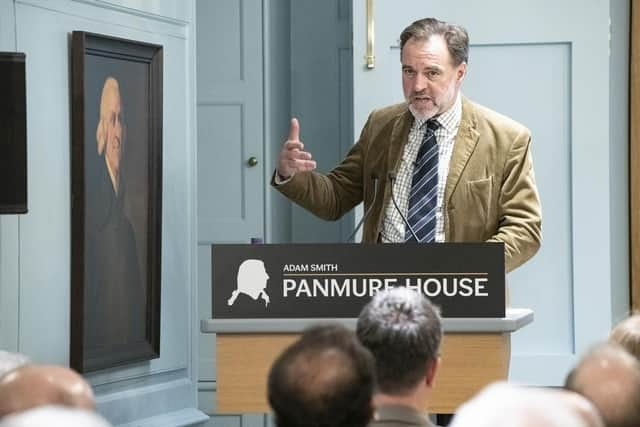The Scottish Enlightenment: a "fantastic explosion of intellectual adventure" still shaping the world today
Professor Niall Ferguson says many cornerstones of modern democratic societies can be traced back to late 18th century Scotland when Adam Smith and his contemporaries were among the leading thinkers in the world.
In the latest episode of the Panmure Podcasts, Ferguson describes Scotland’s ‘miraculous’ transformation in the mid-18th century. He says: “In the 1740s, Scotland still had the reputation Afghanistan has today, as a wild country largely run by warlike clans [in the Highlands], with theological zealots in the Lowlands.
“Yet by the time Adam Smith published The Wealth of Nations [in 1776], Scotland had already established itself as the centre of the Enlightenment….It was an extraordinary intellectual renaissance, an economic miracle.


“Scotland was the original tiger economy but there was much more going on - a fantastic explosion of intellectual adventure.”
This included Smith rethinking how societies work, and how they should work, in The Theory of Moral Sentiments, and doing the same for economies in Wealth of Nations. David Hume “went to the heart of thought and perception itself”, Ferguson argues.
He says that the Enlightenment scholars “nailed individualism” and when he read Smith’s works, 200 years later, “I understood exactly what he was talking about”.
Professor Adam Dixon, Chair of Sustainable Capitalism at Adam Smith’s Panmure House, agrees, saying: “I can picture myself having a conversation with Smith and connecting with him on a really human level.”
Panmure House was the home of Adam Smith, from 1778 until he died there in 1790. The house, near Canongate Kirk in Edinburgh, was rescued from dereliction by Heriot-Watt University and restored in the style of Smith’s era as a centre for open and respectful debate about the biggest issues of the 21st century.
In the latest podcast, Adam Dixon expresses concern at the legacy of the Enlightenment scholars in some people’s eyes.
“I find it personally frustrating, in a 21st context, efforts to cancel many of these great thinkers, not on the basis of what they have to say, but who they are and their identity,” he says.
Ferguson argues that critics fail to understand the contribution of these thinkers to the modern world: “They [the critics] would be hopelessly lost without functioning institutions, infrastructure, an educational system, even the state.
“It was by no means inevitable that an operating system would emerge where living standards consistently rise, innovation continues to happen, individual freedoms grow over time and groups initially at the bottom of the social ladder find ways to climb that ladder. All this can be attributed to one civilisation, born in late 18th century Scotland and successfully exported to North America and many other places.”
The Scottish Enlightenment was the intellectual wellspring for institutions which shaped the modern world, he goes on: competition; private property rights; the rule of law; the scientific revolution and growth of medicine to extend people’s lifespan; the modern work ethic (deferring consumption and accumulating capital); and a consumer society
“They didn't exist anywhere at all prior to the 18th century, which is why there was basically no economic growth,” Prof Ferguson says.
“Something quite miraculous happens that these institutions and ideas take hold in places like lowland Scotland, then spread around the world. We're all beneficiaries. We're all lucky these ideas and institutions spread to the point that most parts of the world have at least some, if not all of them. The big question is, are we going to sabotage those ideas and institutions because of a misconceived notion that somehow the world would have been better off without them?
“I wish I had a time machine…to take people who are so sceptical about modernity in western civilisation on a trip to the 1740s to see what pre-Enlightenment life was like. Try it out for a week - and if you'd like to come back to 2023, we'll consider letting you back.”
Ferguson also explains why he was involved in founding the University of Austin in Texas - an institution “dedicated to the fearless pursuit of truth, that wouldn't engage in political activism [or] discrimination on the basis of identity, that would be meritocratic and not only enshrine academic freedom in principle, but make it enforceable in practice.”
He argues other ‘modern’ US universities - like Chicago and Stanford, founded in the late 19th century - were founded because it was felt that Harvard, Yale and Princeton “were in many ways unsatisfactory”. Prof Ferguson claims that these “gentleman's country clubs” are now “bastions of a woke ideology, which is profoundly illiberal, which pursues an explicitly political agenda”.
He insists there must be a separation between politics and pedagogy in higher education, saying: “You should not abuse the privilege of being a professor by indoctrinating your students. A great many people in a generation younger than me have entirely lost sight of that.”
Ferguson recalls being asked to read Adam Smith’s Wealth of Nations as a 1980s Oxford undergraduate, alongside Karl Marx's Das Kapital and John Maynard Keynes' General Theory of Employment, Interest and Money - and others.
“They ranged right across the political spectrum, and my tutors would have regarded it as quite demented to say, well, the right one is Marx and you mustn’t really believe this dreadful Smith character with his free market doctrine….
“It would have been regarded as appalling misconduct. So something went terribly wrong.”
Ferguson argues: “Once you decolonize the curriculum, and once students only read that which is ideologically aligned, they become really quite ignorant. And they become entirely allergic to ideas that don't fit in with the world view that we sometimes call woke for short.
“I think this means that those students are highly susceptible to the propaganda ploys of the authoritarian regimes.”
For more information on Panmure House’s mission, its wide-ranging programme of lectures by world-leading thinkers (and many other events), see www.panmurehouse.org